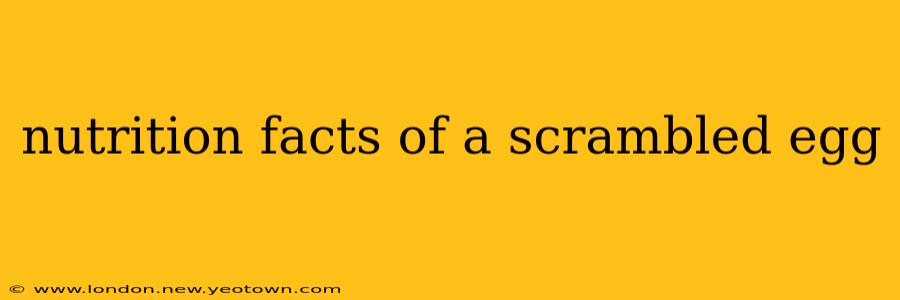The humble scrambled egg. A breakfast staple, a quick lunch, a versatile addition to countless dishes. But have you ever stopped to consider just how nutritious this seemingly simple food really is? Let's delve into the nutritional facts of a scrambled egg and uncover why it deserves a place in a healthy diet.
My journey into the world of nutrition started with a simple question: what exactly am I eating? That led me down a rabbit hole of research, and I'm excited to share what I learned about the nutritional powerhouse that is a scrambled egg.
What are the macronutrients in a scrambled egg?
A large scrambled egg (approximately 50 grams) typically packs a punch with roughly:
- 78 calories: A relatively low-calorie option, perfect for those watching their weight.
- 6 grams of protein: Essential for building and repairing tissues, keeping you feeling full and satisfied.
- 5 grams of fat: Mostly healthy fats, crucial for hormone production and brain function. The fat content can vary depending on how you cook your egg (e.g., adding butter or oil).
- Less than 1 gram of carbohydrates: Making it a great choice for low-carb diets.
How much cholesterol is in a scrambled egg?
This is a frequently asked question, and one that deserves clarification. A large scrambled egg contains approximately 186 milligrams of cholesterol. While high cholesterol was once demonized, current nutritional guidelines emphasize the importance of dietary cholesterol's limited impact on blood cholesterol levels for most people. Focus on overall heart-healthy eating, including plenty of fruits, vegetables, and whole grains, rather than solely fixating on cholesterol in individual foods. However, individuals with specific health concerns should consult their doctor or a registered dietitian.
What vitamins and minerals are in a scrambled egg?
Beyond the macronutrients, the real nutritional magic lies in the vitamins and minerals:
- Vitamin D: Crucial for bone health and immune function. The amount can vary depending on the hen's diet and exposure to sunlight.
- Vitamin B12: Essential for nerve function and red blood cell formation, often lacking in vegetarian and vegan diets.
- Choline: Important for brain health and liver function, often overlooked but crucial for overall well-being.
- Selenium: A powerful antioxidant that protects cells from damage.
- Riboflavin (B2): Involved in energy production and cell growth.
Are scrambled eggs good for weight loss?
Due to their high protein content and relatively low calorie count, scrambled eggs can be a valuable part of a weight loss strategy. The protein helps you feel fuller for longer, reducing cravings and preventing overeating. However, remember to be mindful of added fats like butter or oil during cooking.
Are there any downsides to eating scrambled eggs?
While generally healthy, excessive consumption of eggs can lead to high cholesterol in some individuals. Also, the quality of the eggs matters. Opt for free-range or organic eggs whenever possible to ensure higher nutrient content and better welfare standards for the hens. Furthermore, allergic reactions to eggs are possible, though relatively uncommon.
Conclusion: A Nutritious Addition to Your Diet
The scrambled egg, often overlooked as a simple breakfast, is a remarkably nutritious food. Packed with protein, vitamins, and minerals, it offers a versatile and healthy addition to any diet. Remember to consider portion sizes and overall dietary patterns, and enjoy the delicious and nutritious benefits of a well-prepared scrambled egg.
This information is for general knowledge and does not constitute medical advice. Consult with a healthcare professional or registered dietitian for personalized dietary guidance.

